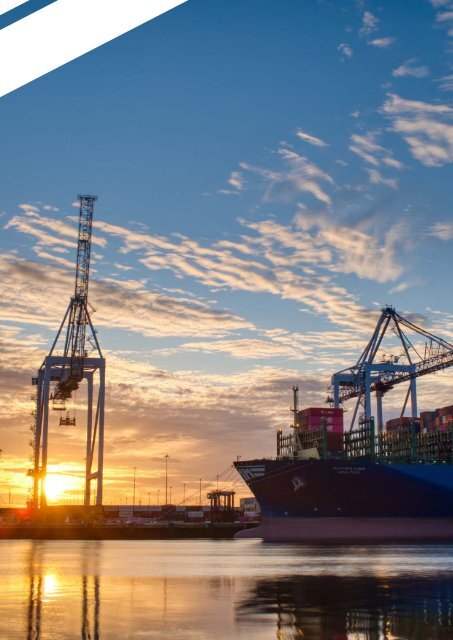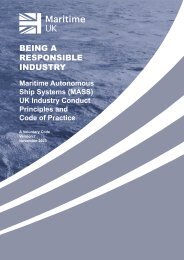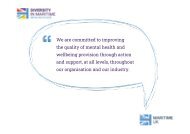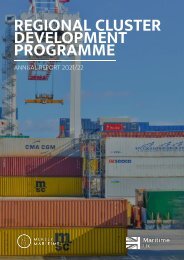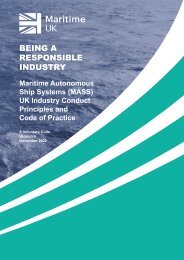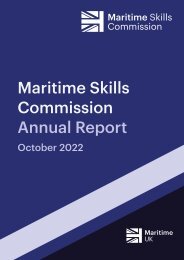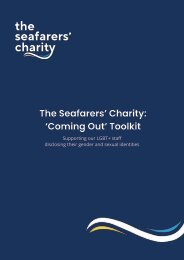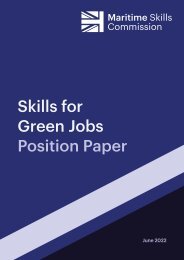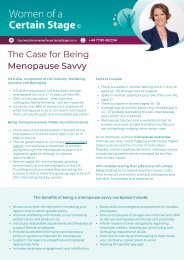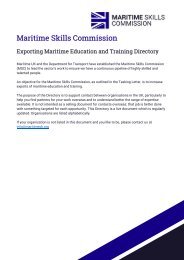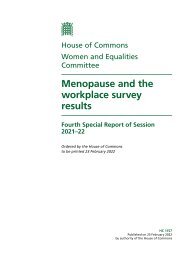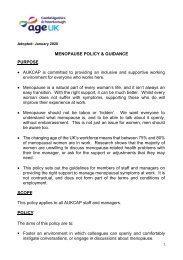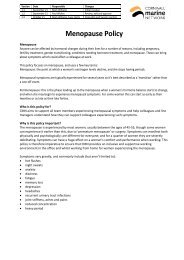Maritime Skills Commission - Future Ports Workforce Research Report - March 2022
You also want an ePaper? Increase the reach of your titles
YUMPU automatically turns print PDFs into web optimized ePapers that Google loves.
<strong>Future</strong> <strong>Ports</strong> <strong>Workforce</strong> <strong>Research</strong> <strong>Report</strong> - 11<br />
The <strong>Future</strong> <strong>Ports</strong> <strong>Workforce</strong><br />
Next steps<br />
The recommendations made in the <strong>Future</strong> <strong>Ports</strong> <strong>Workforce</strong><br />
are comprehensive and, rightly given the importance of<br />
the subject, ask some fundamental questions of the ports<br />
sector itself as well as the wider skills and development<br />
infrastructure.<br />
As the report notes in its first recommendation, clear<br />
sector level leadership is key. The Port <strong>Skills</strong> and Safety<br />
organisation has revitalised its skills focused strategic<br />
pillar, including diversity and inclusion, and is increasing<br />
its resourcing in this area. Given the underlying Port <strong>Skills</strong><br />
and Safety remit and the renewed commitment to the<br />
workforce development agenda it is the right time<br />
to clearly establish Port <strong>Skills</strong> and Safety leadership on<br />
the issues and opportunities covered in the <strong>Future</strong><br />
<strong>Ports</strong> <strong>Workforce</strong>.<br />
The ports trade associations, the UK Major <strong>Ports</strong> Group and<br />
the British <strong>Ports</strong> Associations are committed to working<br />
with Port <strong>Skills</strong> and Safety on the skills agenda. All three<br />
organisations share a common vision of a vibrant, skilled<br />
and diverse workforce as a critical foundation of the<br />
future UK ports sector.<br />
Port <strong>Skills</strong> and Safety will be bringing forward their full<br />
skills strategy shortly. However, to maintain momentum a<br />
number of tangible priority activities have been identified<br />
to progress a number of the report’s recommendations:<br />
A ‘Sprints’ programme on key areas of workforce planning<br />
and development. These are envisaged to be one day<br />
events, using practices from innovation sectors focused<br />
on key workforce landscape dynamics. The aim is to<br />
uncover tangible, tactical quick-wins as well as longer<br />
term strategic requirements. The first one is anticipated<br />
to be on ‘Supply’ – building the local and national pipeline<br />
of talent, responding to Recommendation 4 (Eating the<br />
elephant a mouthful at a time – focused best practice<br />
sharing and ‘sprints’);<br />
A ‘HR masterclass’ series. We aim to hold a series of<br />
practitioner-driven roundtable ‘master classes’ for HR<br />
professionals across the sector. The first event under<br />
development is “Driving progress on diversity – what’s<br />
working, what’s not” in conjunction the <strong>Maritime</strong> UK<br />
Diversity network. This responds to Recommendations 2<br />
(More joint working within the ports and maritime sector<br />
to drive improvements in diversity) and 8 (Developing the<br />
HR capability across the sector).<br />
Sharing and learning with other sectors in coastal<br />
communities. We aim to hold a roundtable with the<br />
offshore energy sector to better understand approaches<br />
to workforce developments and investigate any common<br />
challenges and opportunities for growing talent supply<br />
and development in coastal communities. This responds<br />
to Recommendation 5 (Investigate priority near term skills<br />
gaps/shortages, including learning lessons from sectors).<br />
We will look to work with the <strong>Maritime</strong> <strong>Skills</strong> <strong>Commission</strong><br />
to leverage broader activity in building a detailed<br />
understanding of the future skills needs of the ports<br />
sector. For example, we would look to be active<br />
participants in the <strong>Maritime</strong> <strong>Skills</strong> <strong>Commission</strong>’s and<br />
quantitative ‘future workforce pipeline modelling' project<br />
for maritime to ensure a robust ports outlook. This<br />
responds to Recommendation 3 (Undertake a systematic<br />
review of how skills are used now, and anticipated<br />
changes in skills/job requirements in the future).


